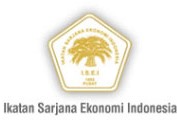Empirical Analysis of Human Capital Convergence in Indonesia
(1) Faculty of Economics, Islamic University of Indonesia, Yogyakarta
Abstract
This research analyzes the convergence hypothesis that applied to human capital which is one of important factor for economic development. This model applied to analyze the condition of provinces in Indonesia that have different conditions of human capital between regions for 33 provinces in Indonesia for two period between 2004 to 2010 and 2010 to 2016. This study uses data panels in estimating with fixed effects model as the best model choice. The result of the analysis for sigma convergence model is a decrease of global dispersion of human capital growth in Indonesia for the both periods. The results of beta convergence confirm the existence of absolute and conditional convergence model for the both periods. The determinants of human capital convergence in first period are economic growth, poverty, illiteracy, access to sanitation, access to clean water, number of health centers, and number of universities. Meanwhile different conditions are shown in the second period where the determinants of conditional convergence of human capital are determined only by economic growth, poverty, and sanitation access.
Keywords
Full Text:
PDFReferences
Afzal, U. (2012) ‘Human Capital Convergence: Evidence from the Punjab’, Lahore Journal of Economics, 17(1), pp. 45–61.
Baltagi, B. H. (2005) Econometric Analysis of Panel Data. 3rd edn. West Sussex: JohnWiley & Sons Ltd.
Barro, R. J. and Sala-i-Martin, X. (1995) ‘Economic Growth’, The Quarterly Journal of Economics, (2).
Becker, G. S. (1962) ‘Investment in Human Capital: A Theoretical Analysis’, Journal of Political Economy, 70(5, Part 2), pp. 9–49.
Becker, G. S. (2006) ‘The Age of Human Capital’, in Education, Globalization and Social Change, pp. 292–294.
Benhabib, J. and Spiegel, M. (1994) ‘The Role of Human Capital in Economic Development’, 4(3), pp. 101–110.
Berry, C. R. and Glaeser, E. L. (2005) ‘The Divergence of Human Capital Levels Accross Cities’, Regional Science, 84(3), pp. 407–444.
Bhakti, N. A., Istiqomah and Suprapto (2011) ‘Analysis of Factors that Influence the Human Development Index in West Java, Ekuitas : Journal of Economics and Development, 18(4), pp. 452–469.
Bils, M. and Klenow, P. J. (2000) ‘Does schooling cause growth?’, American Economic Review, 90(5), pp. 1160–1183.
Castelló, A. and Doménech, R. (2002) ‘Human Capital Inequality and Economic Growth: Some New Evidence’, The Economic Journal, 112(478), pp. C187–C200.
Farah, A. and Puspita Sari, E. (2014) ‘Human Capital and Productivity’, Jejak, 7(1), pp. 22–28.
Firdaus, M. and Yusop, Z. (2009) ‘Dynamic analysis of regional convergence in Indonesia’, International Journal of Economics and Management, 3(1), pp. 73–86.
Hanushek, E. A. (2013) ‘Economic growth in developing countries: The role of human capital’, Economics of Education Review. Elsevier Ltd, 37, pp. 204–212.
Hanushek, E. A. and Kimko, D. D. (2000) ‘Schooling , Labor-Force Quality , and the Growth of Nations’, The American Economic Review, 90(5), pp. 1184–1208.
Islam, N. (1995) ‘Growth Empirics : A Panel Data Approach’, The Quarterly Journal of Economics, Oxford University, 110(4), pp. 1127–1170.
Kharisma, B. and Saleh, S. (2013) ‘Convergence of Income Among Provinces in Indonesia 1984-2008: A Panel Data Approach’, Journal of Indonesian Economy and Business, 28(2), pp. 167–187.
Kim, W.-Y. (2016) ‘Can the Difference in Ageing Across Cities Explain the Divergence of Human Capital Across Cities in Korea?’, Applied Economics Letters, 23(13), pp. 958–964.
Liaskos, G. and Papadas, C. (2009) Human Capital Convergence in Greece: A Panel Data Analysis, Working Papers.
Lucas, R. E. (1988) ‘On the mechanics of economic development’, Journal of Monetary Economics, 22(1), pp. 3–42.
Manca, F. (2012) ‘Human Capital Composition and Economic Growth at the Regional Level’, Journal of European Public Policy, 19(9), pp. 1367–1388.
Mankiw, N. G., Romer, D. and Weil, D. N. (1992) ‘A Contribution to the Empirics of Economic-Growth’, Quarterly Journal of Economics, 107(2), pp. 407–437.
Mincer, J. (1995) ‘Economic Development , Growth of Human Capital , and the Dynamics of the Wage Structure by by’, Journal of Economic Growth, 48(744), pp. 29–48.
Mirza, D. S. (2011) ‘Influence of Poverty, Economic Growth and Capital Expenditure on the Human Development Index in Central Java’, Jejak, 4(2), pp. 102–113.
Pritchett, L. (2001) ‘Where Has All the Education Gone?’, The World Bank Economic Review, 15(3), pp. 367–391.
Ramos, R., Surinach, J. and ArtÃs, M. (2012) ‘Regional Economic Growth and Human Capital: The Role of Over-education’, Regional Studies, 46 (November 2008), pp. 1389–1400.
Romer, P. M. (1990) ‘Human Capital And Growth: Theory and Evidence’, Carnegie-Rochester Conference Series on Public Policy, 32, pp. 251–286.
Sab, R. and Smith, S. C. (2002) ‘Human Capital Convergence : A Joint Estimation Approach’, IMF Staff Papers, 49(2), pp. 200–211.
Schultz, T. W. (1961) ‘Investment in Human Capital’, The American Economic Review, 51(1), pp. 1–17.
Shuaibu, M. and Oladayo, P. T. (2016) ‘Determinants of Human Capital Development in Africa : A Panel Data Analysis’, Oeconomia Copernicana, 7(4), pp. 523–549.
Sodik, J. (2006) ‘Regional Economic Growth: Case Study of Inter-Province Convergence Analysis in Indonesia’, Journal of Development Economics, 11(1), pp. 21–32.
Syukriyah, A. (2016) ‘The Analysis of Absolute Conver-gency of Human Development Inter Provinces in Indonesia’, Economics Development Analysis Journal, 5(4), pp. 362–367.
Vidyattama, Y. (2013) ‘Regional convergence and the role of the neighbourhood effect in decentralised Indonesia’, Bulletin of Indonesian Economic Studies, 49(2), pp. 193–211.
Wibisono, Y. (2005) ‘Sources of Regional Economic Growth: Empirical Study Between Provinces in Indonesia, 1984-2000’, Indonesian Journal of Economics and Development, 5(2), pp. 91–120.
Widarjono, A. (2013) Econometrics: Introduction and Application, Yogyakarta: UPP STIM YKPN.
Wolf, F. and Zohlnhöfer, R. (2009) ‘Investing in human capital? The determinants of private education expenditure in 26 OECD countries’, Journal of European Social Policy, 19(3), pp. 230–244.
Refbacks
- There are currently no refbacks.

This work is licensed under a Creative Commons Attribution 4.0 International License.






